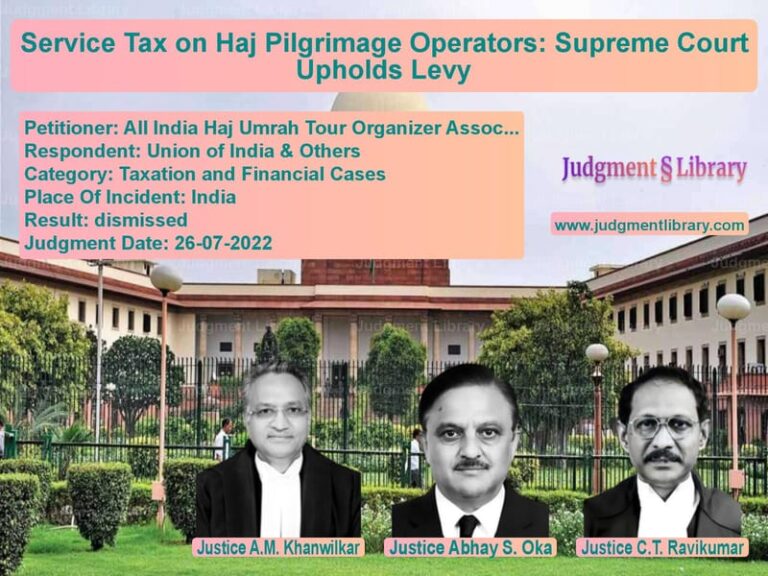Judicial Recusal and Bias: Supreme Court’s Landmark Ruling on Impartiality
The Supreme Court of India, in a significant ruling on October 23, 2019, addressed the complex and contentious issue of judicial recusal and bias. The judgment reaffirmed the principle that a judge’s previous rulings or expressed opinions on legal matters do not automatically disqualify them from hearing cases on similar issues. The decision was pivotal in setting boundaries for judicial impartiality while preventing the misuse of recusal requests as a strategy to manipulate judicial benches.
Background of the Case
The case emerged from concerns raised by the petitioner, who sought the recusal of a judge based on prior legal pronouncements made in similar matters. The petitioner argued that the judge had previously articulated views on key legal questions relevant to the present case, thus raising doubts about impartiality. The respondent countered by asserting that judicial neutrality does not mean a judge must approach every case as a blank slate. Instead, established legal principles and precedent form the foundation of judicial decision-making.
Legal Issues Considered
- Whether prior judicial pronouncements create a perception of bias.
- The extent to which a judge’s previously expressed legal opinions affect impartiality.
- Whether allowing litigants to demand recusal could undermine judicial independence.
Arguments Presented
Petitioner’s Arguments
- The judge’s prior statements on the legal issue in question indicate a pre-determined stance, thereby compromising the fairness of the proceedings.
- Judicial neutrality is a cornerstone of the legal system, and any perceived bias undermines public confidence.
- Several precedents were cited where judges voluntarily recused themselves in similar circumstances.
- The concept of justice must not only be done but must also be seen to be done, making recusal necessary when even an apprehension of bias arises.
Respondent’s Arguments
- The principle of stare decisis implies that judges frequently build upon prior decisions, and mere expression of a legal opinion does not amount to bias.
- Recusal should be based on substantial evidence of partiality rather than speculative concerns.
- Allowing litigants to demand recusal at will could lead to judicial manipulation and forum shopping.
- The judiciary must maintain its authority and prevent litigants from handpicking benches through strategic recusal requests.
Supreme Court’s Observations
The Supreme Court, after analyzing judicial precedents, legal doctrines, and international practices, ruled against the petition for recusal. The judgment emphasized the following principles:
- Judges must decide cases based on law and evidence, not personal preferences or external pressures.
- Prior judgments do not automatically disqualify a judge from hearing similar cases.
- Recusal demands should not be used as a tool to influence judicial benches.
- The judiciary must uphold its independence and resist unwarranted interference.
Important Excerpts from the Judgment
One of the crucial observations made by the Court was:
“A judge who has rendered an opinion on a legal question is not necessarily biased in future cases on the same issue. Judicial objectivity is assessed based on the ability to consider arguments impartially, not merely on past pronouncements.”
Furthermore, the judgment states:
“Recusal should not be compelled by litigants. A judge must recuse only when they themselves feel incapable of adjudicating fairly. Otherwise, judicial independence is at stake.”
Precedents and International Practices Considered
The Supreme Court examined past rulings and international standards on judicial recusal, including:
- State of West Bengal v. Shivananda Pathak: Reaffirming that past rulings do not amount to bias.
- Justice P.D. Dinakaran Case: Establishing that perception of bias must have a reasonable basis.
- R v. Sussex Justices, Ex parte McCarthy: The principle that “justice should not only be done but also seen to be done.”
- American Model Code of Judicial Conduct: Outlining circumstances where judges should voluntarily recuse themselves.
Final Verdict
- The Supreme Court dismissed the petition seeking recusal.
- The Court held that prior judicial pronouncements do not amount to bias.
- The ruling reaffirmed that strategic recusal demands cannot be entertained.
Impact of the Judgment
This verdict reinforces the integrity of judicial decision-making. It clarifies that legal consistency does not equate to bias and protects against the misuse of recusal requests to manipulate case outcomes.
Key Takeaways from the Judgment
- Judicial Objectivity: Judges can rely on past rulings without being automatically considered biased.
- Litigant Manipulation Prevention: The decision ensures that recusal requests are not used to strategically influence judicial benches.
- Judicial Independence Strengthened: The judgment upholds the authority and autonomy of the judiciary.
Conclusion
The Supreme Court’s decision in this case exemplifies a balanced approach to judicial recusal. It sets a precedent that judges must recuse themselves only when they believe they cannot be impartial. This ruling upholds judicial independence and prevents unnecessary disruptions in legal proceedings, ensuring that justice is delivered effectively and impartially.
Petitioner Name: N/A.Respondent Name: N/A.Judgment By: Justice Ravindra Bhat.Place Of Incident: N/A.Judgment Date: 23-10-2019.
Don’t miss out on the full details! Download the complete judgment in PDF format below and gain valuable insights instantly!
Download Judgment: NA vs NA Supreme Court of India Judgment Dated 23-10-2019.pdf
Direct Downlaod Judgment: Direct downlaod this Judgment
See all petitions in Fundamental Rights
See all petitions in Constitution Interpretation
See all petitions in Public Interest Litigation
See all petitions in Judgment by S Ravindra Bhat
See all petitions in dismissed
See all petitions in supreme court of India judgments October 2019
See all petitions in 2019 judgments
See all posts in Constitutional Cases Category
See all allowed petitions in Constitutional Cases Category
See all Dismissed petitions in Constitutional Cases Category
See all partially allowed petitions in Constitutional Cases Category







